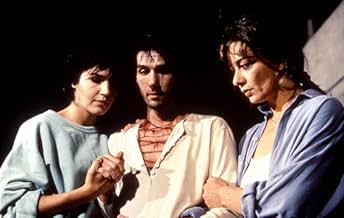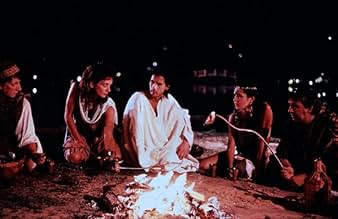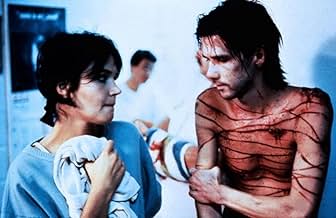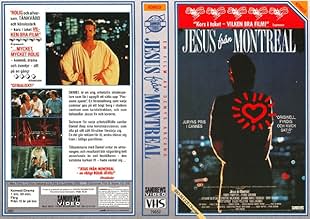Jésus de Montréal
- 1989
- Tous publics
- 1h 58m
IMDb RATING
7.5/10
7.8K
YOUR RATING
A group of actors put on an unorthodox, but acclaimed Passion Play which incites the opposition of the Catholic Church while the actors' lives themselves begin to mirror the Passion itself.A group of actors put on an unorthodox, but acclaimed Passion Play which incites the opposition of the Catholic Church while the actors' lives themselves begin to mirror the Passion itself.A group of actors put on an unorthodox, but acclaimed Passion Play which incites the opposition of the Catholic Church while the actors' lives themselves begin to mirror the Passion itself.
- Director
- Writer
- Stars
- Nominated for 1 Oscar
- 18 wins & 12 nominations total
- Director
- Writer
- All cast & crew
- Production, box office & more at IMDbPro
Featured reviews
All of us knows who Jesus is, right?
This movie brings to light a concept of Jesus that most people do not know is a topic of serious academic scholarship. The question is, "What can we reasonably say about Jesus based solely on historical sources?" Of course, the Bible is the primary source, since Jesus is referred to only in passing by nonreligious sources of his time. And, because this is an historical pursuit, one goal is also to separate those things which are clearly matters of faith from those which do not require a religious faith in the man. Therefore, we are left with a Jesus who led an iconoclastic life and was killed for it. The historian cannot say in an historical journal that Jesus was divine, walked on water, or was raised from the dead. This portrait is called "The Historical Jesus".
The historian can, however, make a personal statement of faith-- "I believe Jesus is the Anointed of God, who saves us from our sins". This is not the statement made by "Jesus of Montreal". Masterfully, the cast and crew of the film weave a tale which demands several viewings to fully consume. Both explicitly and through the use of metaphor, Jesus is depicted as a revolutionary teacher of great charisma and whose life was one of tragedy. But this film is not about the traditional Christian concept of Jesus; rather, it illustrates only the human aspects of the man who is, to me, God incarnate. This is the story of Jesus, the man-- not Jesus, the Christ. Christians may be disappointed by it, or outraged, but I encourage us all to remember that where that where faith (trust in that which cannot be observed) begins, there the historian (or scientist) must stop. Believers go further. I highly recommend this movie to anyone who wants to think, be they a believer or not.
This movie brings to light a concept of Jesus that most people do not know is a topic of serious academic scholarship. The question is, "What can we reasonably say about Jesus based solely on historical sources?" Of course, the Bible is the primary source, since Jesus is referred to only in passing by nonreligious sources of his time. And, because this is an historical pursuit, one goal is also to separate those things which are clearly matters of faith from those which do not require a religious faith in the man. Therefore, we are left with a Jesus who led an iconoclastic life and was killed for it. The historian cannot say in an historical journal that Jesus was divine, walked on water, or was raised from the dead. This portrait is called "The Historical Jesus".
The historian can, however, make a personal statement of faith-- "I believe Jesus is the Anointed of God, who saves us from our sins". This is not the statement made by "Jesus of Montreal". Masterfully, the cast and crew of the film weave a tale which demands several viewings to fully consume. Both explicitly and through the use of metaphor, Jesus is depicted as a revolutionary teacher of great charisma and whose life was one of tragedy. But this film is not about the traditional Christian concept of Jesus; rather, it illustrates only the human aspects of the man who is, to me, God incarnate. This is the story of Jesus, the man-- not Jesus, the Christ. Christians may be disappointed by it, or outraged, but I encourage us all to remember that where that where faith (trust in that which cannot be observed) begins, there the historian (or scientist) must stop. Believers go further. I highly recommend this movie to anyone who wants to think, be they a believer or not.
A robust, inventive parallel to the life of Christ. This film seems to display utter commitment and genuine integrity. It is moving without being sentimental, and tells its tale with rigour and without too many contrived plot developments. The performances are splendid. You don't have to be religious to appreciate this one, since it stands up in its own right, even if the parallels are ignored. Deserves to be better known.
What if Jesus had been born in the year 1970 instead of year 1, and as unheralded now as He was then- how would our society have dealt with Him?
And if people can get possessed by the Devil, can a regular guy -- not a nut or a fraud -- become gradually and genuinely possessed by Jesus?
Denys Arcand answers both questions in clever and entertaining fashion. With actual events, people, words and thoughts from Jesus' life being transposed to our modern times. Of course a movie like this is aimed at people who don't turn both their brain cells off as they enter the movie house, and won't be happy with 90 minutes of gunshots, car chases, or Jesus being whipped.
And yet this highly hypothetical parable still comes off as a plausible dramatic tale, with the usual Arcand mix of tragedy and comedy. You could have never heard of Jesus and still enjoy this movie.
The cinematography is gorgeous and the main actors are uniformly excellent. Some of the minor characters bother me intensely, which they are meant to do -- they're just too darn good at it.
The script and direction are nicely conventional - in the sense that at no time does the viewer wonder who that guy is or what the heck is going on. Jarring "artsy" cuts, unannounced flashbacks and weird camera angles are many critics' cup of tea but not mine, and thankfully, not Arcand's either.
There is quite a bit of tension-relieving slapstick in this story; some viewers may like it- it *is* funny, but it makes me uncomfortable at times. And the ending is a bit of an anticlimax, although at the second viewing I think I began to see the light.
I originally rated this movie 8/10, but after seeing it again I got more in tune with it and also noticed a few very clever details, so I'm upping it to 9/10. Maybe 10/10 when I see it next.
And if people can get possessed by the Devil, can a regular guy -- not a nut or a fraud -- become gradually and genuinely possessed by Jesus?
Denys Arcand answers both questions in clever and entertaining fashion. With actual events, people, words and thoughts from Jesus' life being transposed to our modern times. Of course a movie like this is aimed at people who don't turn both their brain cells off as they enter the movie house, and won't be happy with 90 minutes of gunshots, car chases, or Jesus being whipped.
And yet this highly hypothetical parable still comes off as a plausible dramatic tale, with the usual Arcand mix of tragedy and comedy. You could have never heard of Jesus and still enjoy this movie.
The cinematography is gorgeous and the main actors are uniformly excellent. Some of the minor characters bother me intensely, which they are meant to do -- they're just too darn good at it.
The script and direction are nicely conventional - in the sense that at no time does the viewer wonder who that guy is or what the heck is going on. Jarring "artsy" cuts, unannounced flashbacks and weird camera angles are many critics' cup of tea but not mine, and thankfully, not Arcand's either.
There is quite a bit of tension-relieving slapstick in this story; some viewers may like it- it *is* funny, but it makes me uncomfortable at times. And the ending is a bit of an anticlimax, although at the second viewing I think I began to see the light.
I originally rated this movie 8/10, but after seeing it again I got more in tune with it and also noticed a few very clever details, so I'm upping it to 9/10. Maybe 10/10 when I see it next.
Daniel Coulombe is recruited by Father LeClerc to jazz up the traditional Passion play (a dramatic representation of the events leading to the passion and Crucifixion of Jesus) staged in Montreal's Catholic Sanctuary. Coulombe, in turn, gathers a group of actors/apostles, ranging from unemployed actor Remy (now overdubbing dialogue on porn movies) to ambitious commercial actress Mireille. Together, they workshop a controversial and moving Passion play which leaves audiences awestruck and the priests reeling, as the production challenges the dogma and hipocrisy of the Catholic church.
Director Denys Arcand weaves a remarkably deep tale which comments on commercialism, selling out, spirituality, theological scholarship, fidelity, loyalty and more- but in a manner that is relatively subtle and humorous, so the film never feels didactic. The somewhat magical effects of the theatre come across beautifully; in fact, "Jesus Of Montreal" is a must for anyone involved with the Theatre. For those interested in film trivia, you'll notice that there are veiled biblical/mythical references throughout the film, (Magdalen lobster, the Lawyer as Satan, The Charon restaurant), and that the director appears as a judge when Daniel is on trial. The story itself is well constructed, and its somber denouement drives home the suggestion that resistance and a revolutionary viewpoint are liable to bring ill fortune...
You don't have to be Catholic- or even 'religious' - to enjoy "Jesus Of Montreal": this is a film for anyone who has ever contemplated the difference between spirituality and religion, or who has had to make a decision between doing what the system demanded and doing what they believe is the honest thing to do.
Director Denys Arcand weaves a remarkably deep tale which comments on commercialism, selling out, spirituality, theological scholarship, fidelity, loyalty and more- but in a manner that is relatively subtle and humorous, so the film never feels didactic. The somewhat magical effects of the theatre come across beautifully; in fact, "Jesus Of Montreal" is a must for anyone involved with the Theatre. For those interested in film trivia, you'll notice that there are veiled biblical/mythical references throughout the film, (Magdalen lobster, the Lawyer as Satan, The Charon restaurant), and that the director appears as a judge when Daniel is on trial. The story itself is well constructed, and its somber denouement drives home the suggestion that resistance and a revolutionary viewpoint are liable to bring ill fortune...
You don't have to be Catholic- or even 'religious' - to enjoy "Jesus Of Montreal": this is a film for anyone who has ever contemplated the difference between spirituality and religion, or who has had to make a decision between doing what the system demanded and doing what they believe is the honest thing to do.
A priest in a large Catholic church in Montreal thinks the church's annual passion play is getting stale and needs updating. He hires Daniel, an actor, to accomplish this task. Daniel takes his assignment seriously, thinking and studying and putting together a cast of talented actors. The quest for the cast is quite humorous - one actor is dubbing an adult movie, another is appearing in a perfume ad (where she is seen walking on water), and so forth. The actors indeed come up with a play that has the play's audience moving from location to location for the performance of each station.
The passion play performed in this movie gave me a better appreciation and understanding of the power and significance of the Jesus myth than anything I have ever read or seen. As a lifelong atheist I can say it is wonderful. Lothaire Bluteau gives a powerful (even passionate?) performance as Jesus.
I was uncertain where "Jesus of Montreal" was going after the performance of the passion play. But that is where things really got interesting. Performing the play has had a marked effect on the cast and Daniel's life starts to take on certain aspects of the life of Christ. Director/writer Denys Arcand is clever in the way he presents the parallels.
Daniel is tempted by a publicist who tells him he can make him rich and famous and details some of the techniques. One suggestion is that Daniel write a book, and when Daniel says he doesn't have anything to say the publicist retorts, "Some ways of saying nothing go over so well. Think of Ronald Reagan." And there are plenty of writers who could write the book and, at the least, Daniel could publish a cookbook, since they always sell.
There is a parallel to Christ's running the moneychangers out of the temple, healing the sick, and even the crucifixion. The play is too avant-garde for the Church and they try to shut it down - refusing to desist Daniel is arrested in the middle of the play while he is on the cross. The movie is filled with such pointed commentary.
In passing Arcand touches on the deficiencies of the Canadian health care system (an emergency patient is told to take number forty-eight and wait in line), a topic that he would expand on in "The Barbarian Invasions." As a subtle commentary in the context of the story, Saint Mark's Hospital is seen as hopelessly chaotic whereas the Jewish hospital is shown as professional and efficient.
As Daniel and his troupe of actors take on more and more of a modern day version of Jesus and his disciples the question arises as to what the reaction would be to Jesus in our modern society. The answer seems to be that he would be regarded as a nut case except by the few who knew him closely and identified with his message.
Arcand's talents as a director are not to be underestimated. The staging of the passion play is beautifully done and some of the camera angles used in the church scenes are very creative. As in other Arcand films he uses music by Francois Dompierre mixed with some classical compositions (in this case Pergolesi) to great effect.
I came to this movie after having seen and enjoyed Arcand's "The Decline of the American Empire" and "The Barbarian Invasions." After now having seen "Jesus of Montreal," I think I can say I am an Arcand fan.
This is a clever, humorous, satiric, and absorbing film.
The passion play performed in this movie gave me a better appreciation and understanding of the power and significance of the Jesus myth than anything I have ever read or seen. As a lifelong atheist I can say it is wonderful. Lothaire Bluteau gives a powerful (even passionate?) performance as Jesus.
I was uncertain where "Jesus of Montreal" was going after the performance of the passion play. But that is where things really got interesting. Performing the play has had a marked effect on the cast and Daniel's life starts to take on certain aspects of the life of Christ. Director/writer Denys Arcand is clever in the way he presents the parallels.
Daniel is tempted by a publicist who tells him he can make him rich and famous and details some of the techniques. One suggestion is that Daniel write a book, and when Daniel says he doesn't have anything to say the publicist retorts, "Some ways of saying nothing go over so well. Think of Ronald Reagan." And there are plenty of writers who could write the book and, at the least, Daniel could publish a cookbook, since they always sell.
There is a parallel to Christ's running the moneychangers out of the temple, healing the sick, and even the crucifixion. The play is too avant-garde for the Church and they try to shut it down - refusing to desist Daniel is arrested in the middle of the play while he is on the cross. The movie is filled with such pointed commentary.
In passing Arcand touches on the deficiencies of the Canadian health care system (an emergency patient is told to take number forty-eight and wait in line), a topic that he would expand on in "The Barbarian Invasions." As a subtle commentary in the context of the story, Saint Mark's Hospital is seen as hopelessly chaotic whereas the Jewish hospital is shown as professional and efficient.
As Daniel and his troupe of actors take on more and more of a modern day version of Jesus and his disciples the question arises as to what the reaction would be to Jesus in our modern society. The answer seems to be that he would be regarded as a nut case except by the few who knew him closely and identified with his message.
Arcand's talents as a director are not to be underestimated. The staging of the passion play is beautifully done and some of the camera angles used in the church scenes are very creative. As in other Arcand films he uses music by Francois Dompierre mixed with some classical compositions (in this case Pergolesi) to great effect.
I came to this movie after having seen and enjoyed Arcand's "The Decline of the American Empire" and "The Barbarian Invasions." After now having seen "Jesus of Montreal," I think I can say I am an Arcand fan.
This is a clever, humorous, satiric, and absorbing film.
Did you know
- TriviaMore instances that mirror the life of Christ as recorded in the Gospels: - Daniel recruits actors to work with him similar to the way Jesus recruited his disciples. The first, Constance, is found working charitably in a soup kitchen, and Daniel says simply, "I came for you." - The judge (like Pilate) sends Daniel to a second-opinion person (the psychologist is like Herod) who finds nothing wrong with him and sends him back to the judge/Pilate.
- GoofsAround 1:46:21. Boom mic enters the shot twice above Constance when she's talking to the ambulance paramedic at the hospital.
- SoundtracksPritouritze Planinata
Performed by Les Voix Bulgares
- How long is Jesus of Montreal?Powered by Alexa
Details
- Release date
- Countries of origin
- Official sites
- Languages
- Also known as
- Jesus of Montreal
- Filming locations
- Production companies
- See more company credits at IMDbPro
Box office
- Gross US & Canada
- $1,601,612
- Opening weekend US & Canada
- $20,388
- May 27, 1990
- Gross worldwide
- $1,601,612
- Runtime
- 1h 58m(118 min)
- Color
- Sound mix
- Aspect ratio
- 1.85 : 1
Contribute to this page
Suggest an edit or add missing content




































